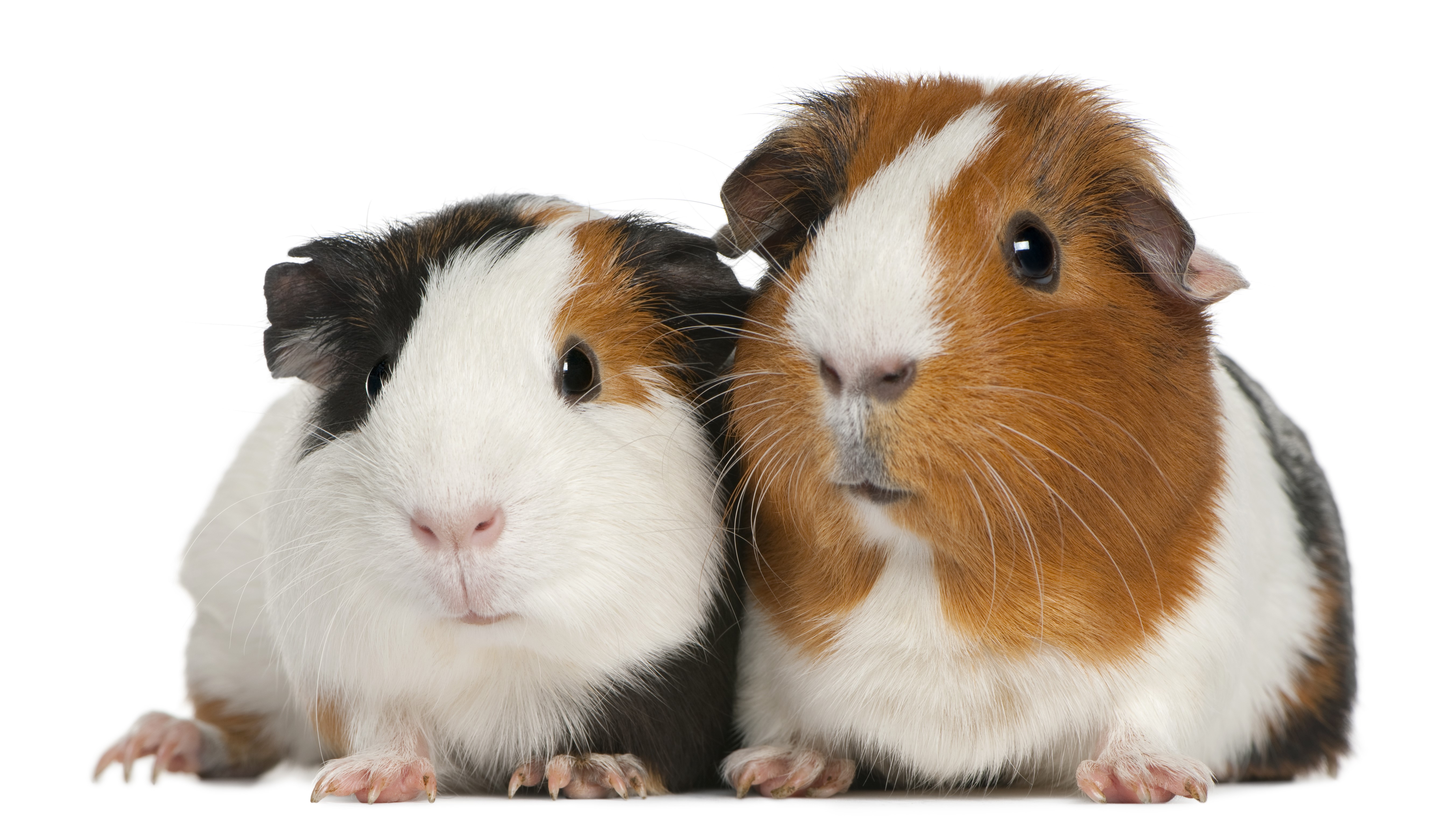
Suitable Guinea Pig Housing to meet Animal Welfare
Although guinea pigs are small creatures, they need plenty of space to run around in. Providing them with secure housing and with an outdoor run will help to keep them active, happy and healthy.
Basically: Ideally as big as you can – with access to outside to graze.
Guinea Pigs Hutches and cages
You can house your guinea pigs in an outdoor hutch. Ideally, the hutch should be situated in a shed or an outbuilding; this will protect the guinea pigs from extremes of weather and from predators.
You can put the hutch in your garage, provided there is plenty of natural daylight. The garage shouldn’t be used by motor vehicles because fuel fumes could harm – or even kill – your guinea pigs.
Alternatively, you can buy an indoor cage and keep your guinea pigs inside your house.
There are many suitable cages on the market and they are usually made of plastic with a mesh lid. Make sure that the cage is positioned away from draughts, direct sunlight and noisy areas (such as near a TV or a radio); noise will cause the guinea pigs stress. A quiet room, where there is contact with the family, is best.
The minimum sizes we recommend for a pair of guinea pigs are
-
Hutches: 4ft long x 2ft deep x 2ft high
-
Runs: 6ft long x 4ft wide x 2ft high
These are minimum sizes. Generally, the larger the housing is, the better it is for your pets but it depends on how many guinea pigs you have as to how much space they need. The more space your guinea pigs have the better as they are very active and are often housed in their hutch or indoor cage for longer periods during the winter months.
Guinea pig hutches and cages come in all shapes and sizes including single, 2 and 3 tier hutches and single and double storey cages. However, it is essential that at least one of the floors has lots of room to run and play. They will also need a run (either indoors or outdoors) so they can really stretch their legs and have a good play and run around on a regular basis. We think single storey hutches are best and you can find out more about the
The shed:
-
The perfect way to create lots of space for a herd of guinea pigs is to convert your shed.
-
You should make sure that the shed has plenty of natural daylight and fresh air. Attach a low, solid gate to the doorway of the shed; the barrier will prevent the guinea pigs from escaping whilst providing easy access for you.
-
Line the floor with vinyl and put newspaper on top of this. Next, cover the paper with a thick layer of hay or Readigrass. Add some tunnels and hidey-holes to give the guinea pigs somewhere to hide and places to explore.
The Guinea Pig Outdoor Run
-
Your guinea pigs should have the opportunity to graze in a grassy outdoor run for at least four hours every day, weather permitting.
-
Make sure that the lid of the run is secure enough to keep them safe from predators.
-
Guinea pigs don’t like to graze in the open, so provide them with places to hide: tunnels, boxes, houses and piles of grass will make them feel more confident and let them graze contentedly. Place some sheeting or waterproof fabric over some of the run to provide shade, or shelter from unexpected showers.
Guinea Pig Bedding Materials
-
Hutches and sheds can be lined with vinyl. The cheapest – and safest – material to put on top of that is newspaper.
-
Next, you will need a generous layer of hay. You can buy hay in bulk from farm shops and horse suppliers. Guinea pigs don’t just sleep on hay: it is also the largest component of their diet. Select hay that is light green or light brown in colour and make sure that it smells sweet and fresh.
-
Guinea pigs love fleece!
-
Be choosy: coarse, yellowing hay will provide no nutrition; it may also contain parasites.
-
Straw and wood shavings should never be used.
-
Straw has no nutritional value and its sharp edges can cause scratches and eye injuries.
-
Wood shavings may contain parasites; they are also very dusty and so can give rise to breathing problems and allergic reactions in both you and your guinea pigs.
-
Clean accommodation can help to ward off health problems. You should remove soiled hay every day and provide a fresh pile.
-
The living areas should be cleaned weekly during fine weather but at least twice weekly when it’s cold or wet and the guinea pigs spend more time indoors.
-
Use a suitable pet disinfectant.
Our adoption contract states that if your new family member is not working out, to contact WAW and we will accept the Guinea Pig back and start the rehoming procedure again. Do not rehome the Guinea Pig yourself.
Settling in a new pet Guinea Pig can take time and may take a couple of months. Patience and following these guidelines will help. You can always contact us for advice.
There is an excellent group on Facebook for Guinea Pig owners, full of advice and tips: Guinea Pigs Uk www.facebook.com/groups/guineapigsuk/
